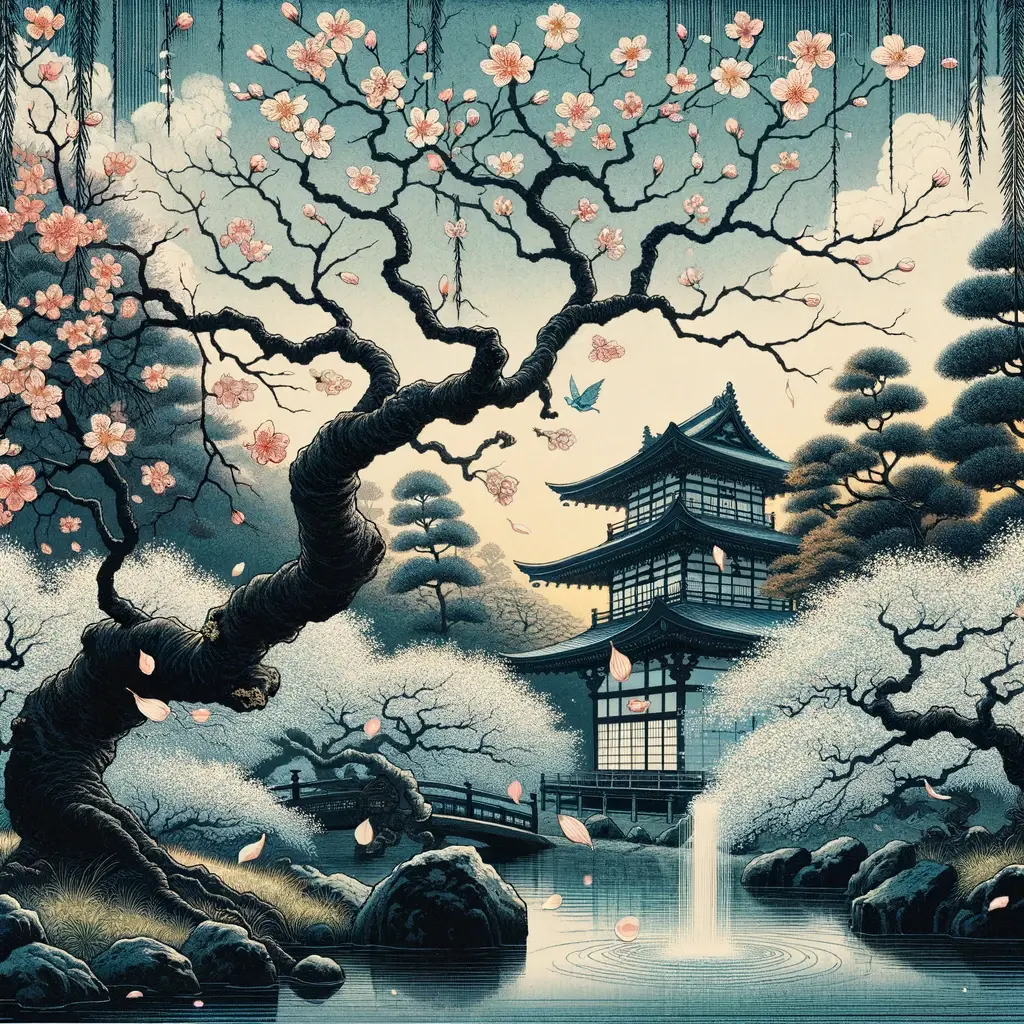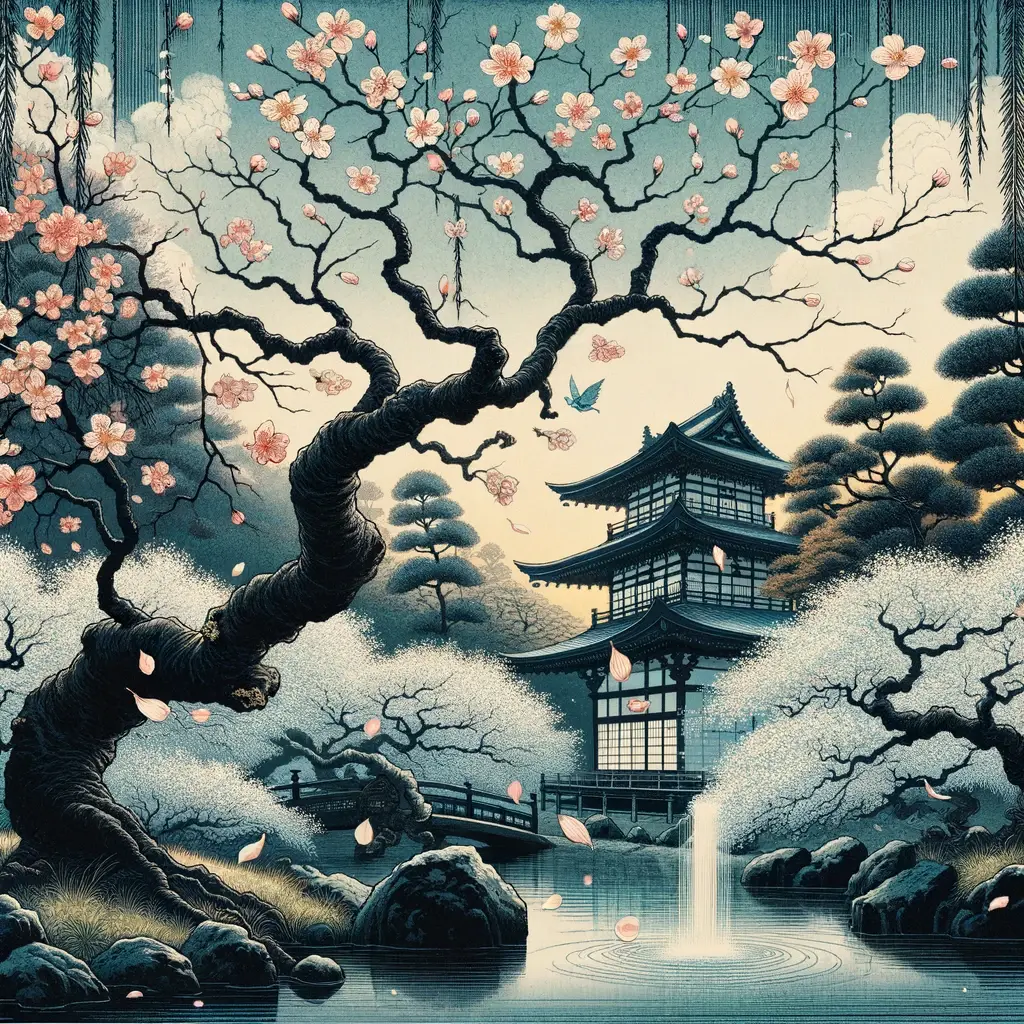
Ephemeral cherry blossoms remind us: sensual desires, like petals, are transient, teaching the beauty of letting go
1.11
“Mendicants, I do not see a single thing that gives rise to sensual desire, or, when it has arisen, makes it increase and grow like the feature of beauty.
When you apply the mind irrationally to the feature of beauty, sensual desire arises, and once arisen it increases and grows.”
1.16
“Mendicants, I do not see a single thing that prevents sensual desire from arising, or, when it has arisen, abandons it like the feature of ugliness.
When you apply the mind rationally to the feature of ugliness, sensual desire does not arise, or, if it has already arisen, it’s given up.”

From ice to flow: a heart's journey from ill will to compassion, melting barriers through the warmth of love
1.12
“Mendicants, I do not see a single thing that gives rise to ill will, or, when it has arisen, makes it increase and grow like the feature of harshness.
When you apply the mind irrationally to the feature of harshness, ill will arises, and once arisen it increases and grows.”
1.17
“Mendicants, I do not see a single thing that prevents ill will from arising, or, when it has arisen, abandons it like the heart’s release by love.
When you apply the mind rationally on the heart’s release by love, ill will does not arise, or, if it has already arisen, it’s given up.”

Emerging from darkness into light, a new dawn on the peak symbolizes awakening from dullness to a state of vigor and clarity
1.13
“Mendicants, I do not see a single thing that gives rise to dullness and drowsiness, or, when they have arisen, makes them increase and grow like discontent, sloth, yawning, sleepiness after eating, and mental sluggishness.
When you have a sluggish mind, dullness and drowsiness arise, and once arisen they increase and grow.”
1.18
“Mendicants, I do not see a single thing that prevents dullness and drowsiness from arising, or, when they have arisen, gives them up like the elements of initiative, persistence, and vigor.
When you’re energetic, dullness and drowsiness do not arise, or, if they’ve already arisen, they’re given up.”

A lotus blooming in still waters: amidst life's ripples, peace of mind flourishes, undisturbed and serene
1.14
“Mendicants, I do not see a single thing that gives rise to restlessness and remorse, or, when they have arisen, makes them increase and grow like an unsettled mind.
When you have no peace of mind, restlessness and remorse arise, and once arisen they increase and grow.”
1.19
“Mendicants, I do not see a single thing that prevents restlessness and remorse from arising, or, when they have arisen, gives them up like peace of mind.
When your mind is peaceful, restlessness and remorse do not arise, or, if they’ve already arisen, they’re given up.”

A lighthouse piercing the fog, guiding through doubt with the clarity of rational thought, illuminating the path to certainty
1.15
“Mendicants, I do not see a single thing that gives rise to doubt, or, when it has arisen, makes it increase and grow like irrational application of mind.
When you apply the mind irrationally, doubt arises, and once arisen it increases and grows.”
1.20
“Mendicants, I do not see a single thing that prevents doubt from arising, or, when it has arisen, gives it up like rational application of mind.
When you apply the mind rationally, doubt does not arise, or, if it’s already arisen, it’s given up.”
In this teaching, the Buddha is sharing on the fuels for the five hindrances, and the antidotes to prevent the growth or give up any arisen hindrance. Below is a table summarizing the teaching:
| Hindrance | Fueled By | Antidote |
|---|---|---|
| Sensual Desire | Applying the mind irrationally to the feature of beauty | Apply the mind rationally to the feature of ugliness |
| Ill Will | Applying the mind irrationally to the feature of harshness | Cultivate heart's release by love |
| Complacency (Dullness) | Discontent, sloth, yawning, sleepiness after eating, and mental sluggishness | Application of initiative, persistence, and vigor |
| Restlessness and Remorse | Unsettled mind | Cultivate peace of mind |
| Doubt | Irrational application of mind | Rational application of mind |
Related Teachings:
- Navigating through 30 mental qualities that lead to enlightenment, to the arising of the Buddha (AN 10.76) - The Buddha shares 30 mental qualities to uproot and their antidotes to cultivate in ten pairs of threes. This teaching can be used to see the next layer of qualities one can uproot and its antidote qualities to be cultivated.
- Steadying the mind against the poisons of greed, hate and delusion (AN 4.117) - A teaching on the three poisons of the mind that lead to rebirth, and intoxication which prevents understanding the causes of greed, hate, and delusion.
- Eight harmful and beneficial qualities ↗️ - A teaching on the eight harmful and beneficial qualities that either lead to decline or growth in the teachings.

You're welcome. An irrational application of mind implies, scattered thoughts, a fault-finding nature, or a mind that works on assumptions/beliefs. There is another teaching where the Buddha shares the causes that lead to an irrational application of mind as well as antidotes to it: 30 mental qualities that lead to enlightenment, to the arising of the Buddha (AN 10.76).
It is good that you're reflecting on the teachings to independently verify them. 🙂